|
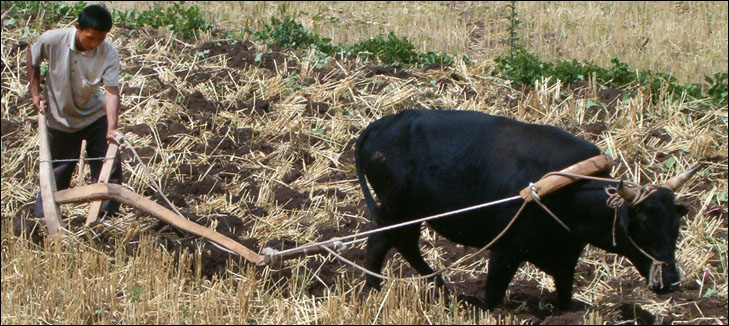 Farming in the southeast China mountains calls for muscle. Farming in the southeast China mountains calls for muscle.
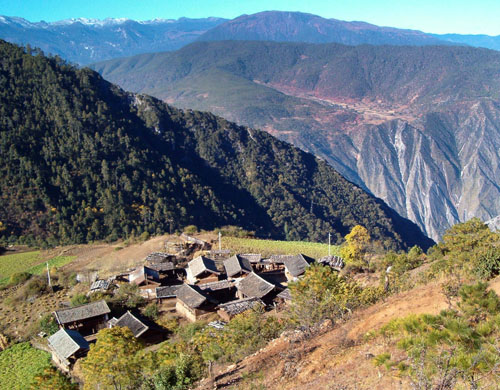 Villages perch where they can in the steep terrain. Those visited by Liu are at 8,000 to 10,000 feet elevation. Kai Kindness
Mike Liu helps in China
by Sheela McLean
photos courtesy of Mike Liu
Methow Valley resident Mike Liu has been volunteering in southwest China for a while now, helping residents in the mountains improve their agriculture and their lives.
The Yunnan and Sichuan provinces, where he has been working periodically, lean towards Tibet culturally, Liu explained. The villages where he's stayed are generally at 8,000 to 10,000 feet, which lends the area a climate rather like Wenatchee's. People there live in log and mud brick homes and they farm.
The mountain topography is so rough that residents have historically tended to be isolated: many dialects and languages have evolved there over time. Mandarin Chinese is now the shared language. Liu said he speaks Mandarin passably.
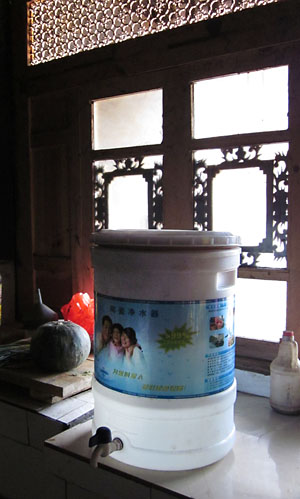 Filters supplied by the Zia organization take water-borne pathogens out of the drinking water. Liu's work has focused mainly on improving community health by providing and installing ceramic water filters to clean out the water-borne pathogens that infest that area of the world. His goal is to help see that "kids can go to school without diarrhea all the time."
Liu volunteers in a small, non-government organization named "Kai", which is a Chinese word that roughly translates to "victory." Kai is headed by an American, but is registered in China, and is committed to agricultural development in rural communities.
"One of our mainstays is building greenhouses," he said. They hope to extend the resident's growing season so they can move to a diet beyond the "traditional salted pork and root crops." The "lack of green vegetables" in the colder seasons is a health problem. Hothouses extend the growing season, making green vegetables available both earlier and later in the year.
Each greenhouse "made of blue plastic over poles" is built to serve a family unit plus their relatives. The Kai organization provides the plastic, which costs $50 to $75 per greenhouse, a prohibitive amount for most families.
"They supply the wood, we supply the plastic," and then everyone builds the greenhouse, Liu explained. The blue plastic usually lasts three years before it needs to be replaced.
Of course, other opportunities to help arise. The Kai group also contributes to erosion control by planting nitrogen-fixing native trees in the area. The trees roots help anchor the soil, and the leaves can be picked for fodder for farm animals.
"Dental care in rural China is limited," said Liu. The Kai group helps provide dental clinics.
Liu said that English language skills are highly sought after and pursued. Classroom teachers ask fluent English speakers to attend their classes and help with the language.
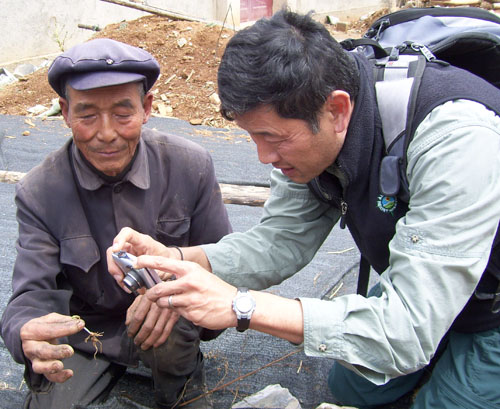 Mike Liu photographs the seedling root of a medicinal plant, held by Mr. He. "I get a lot of satisfaction from just knowing that I've been able to help improve the life of these rural villagers," said Liu. And he said, the trips also "satisfy that desire for adventure" and give him "a better global perspective."
"Seeing environmental impacts around the world adds perspective that benefits me in my position as ranger here," he added.
Liu is currently the ranger at the Forest Service's Methow Valley Ranger District in Winthrop. He has traveled to China a total of 10 times, three to five weeks each time, to volunteer with the Kai organization. And earlier, he took a one-year leave of absence to live in the area.
Liu was inspired to visit China by a magazine article about a Chinese minority group living in poverty at high elevation, in a place accessible mostly by foot trail. He has a Chinese background: his family arrived in this country in 1966 from Taiwan. He claims direct descent from Emporer Liu Bei, ruler of Shu Han in the Three Kingdoms period of Chinese history. He said that Liu Bei's family was caught in war and many died, but his own ancestors were able to flee to southeast China. They survived and later moved to Shangai.
Liu is married to Jan and has four children: Daniel, Netsie,(Annette), Christina and Kimberley.
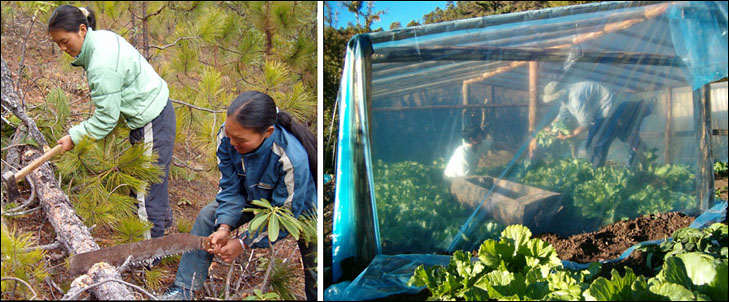 LEFT: Villagers cut local timber for construction wood. RIGHT: Villagers harvest crops in one of the completed, simple greenhouses. The structures make fresh greens available for more of the year. LEFT: Villagers cut local timber for construction wood. RIGHT: Villagers harvest crops in one of the completed, simple greenhouses. The structures make fresh greens available for more of the year.
7/8/2013
see past stories in the archive >>
|
